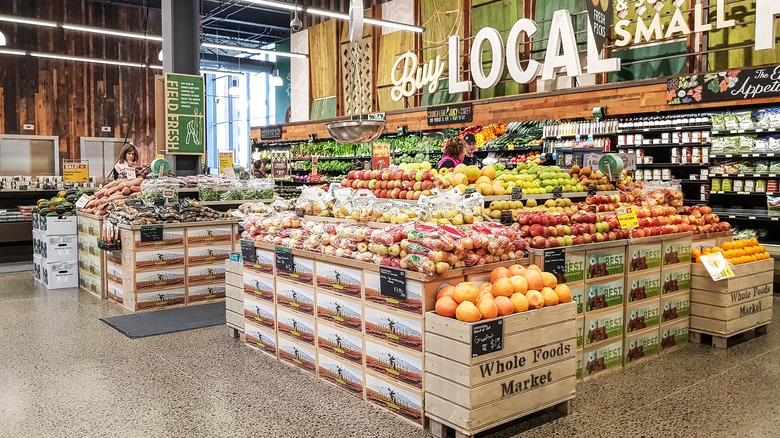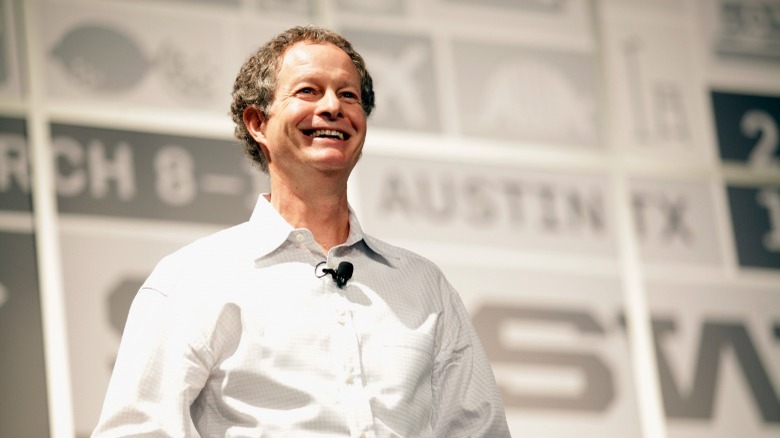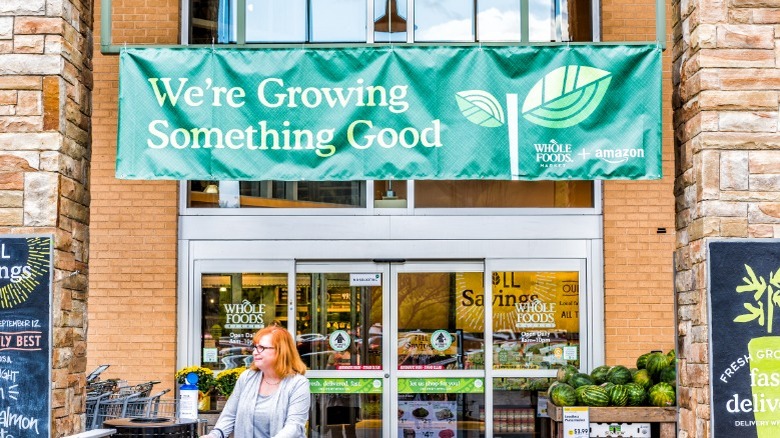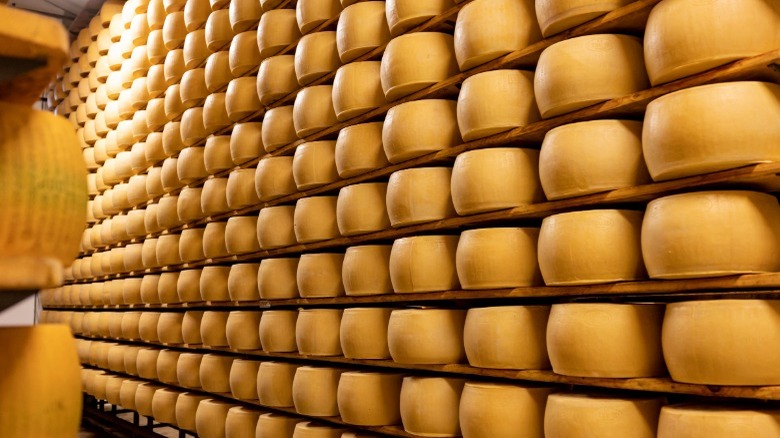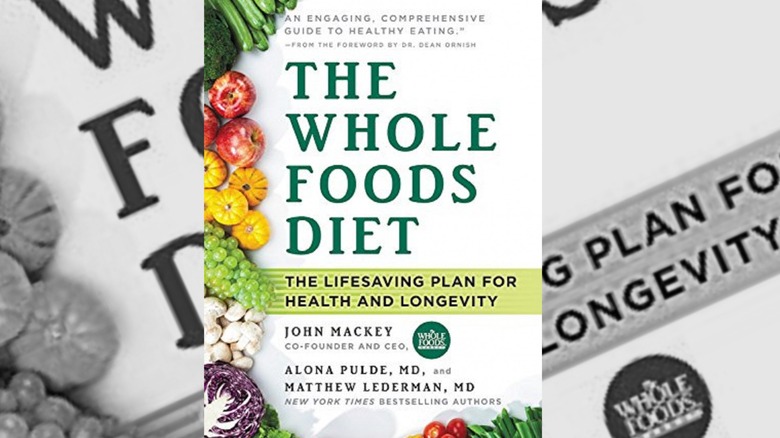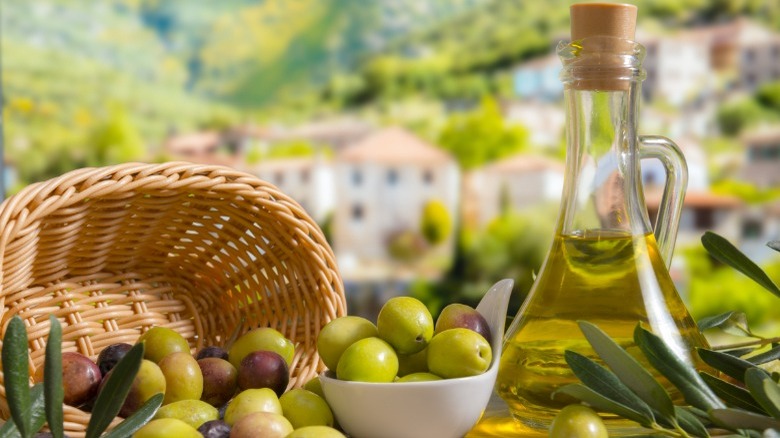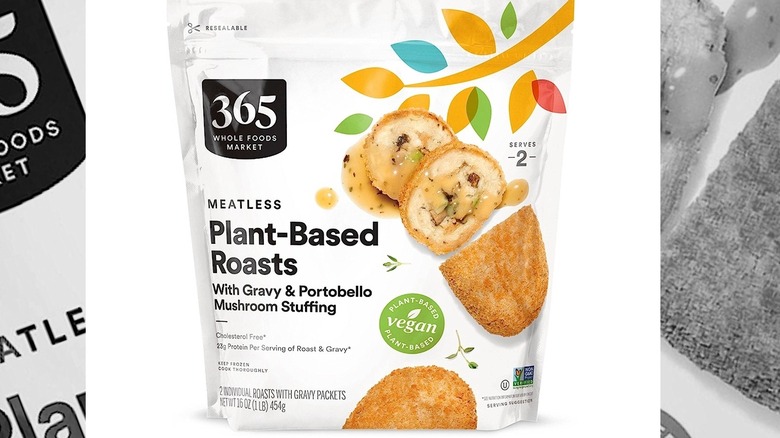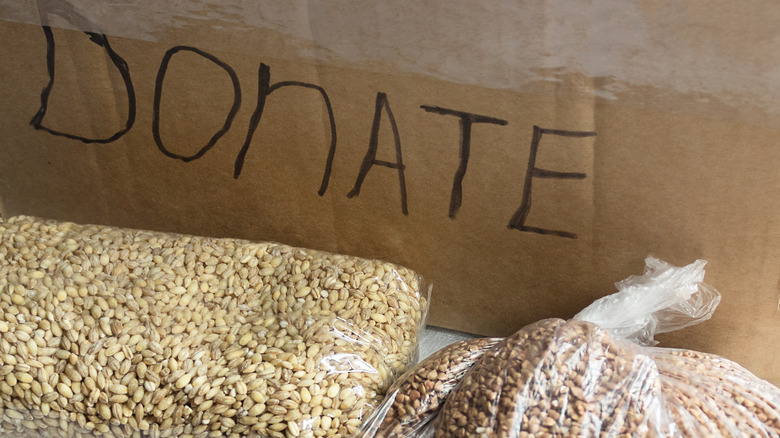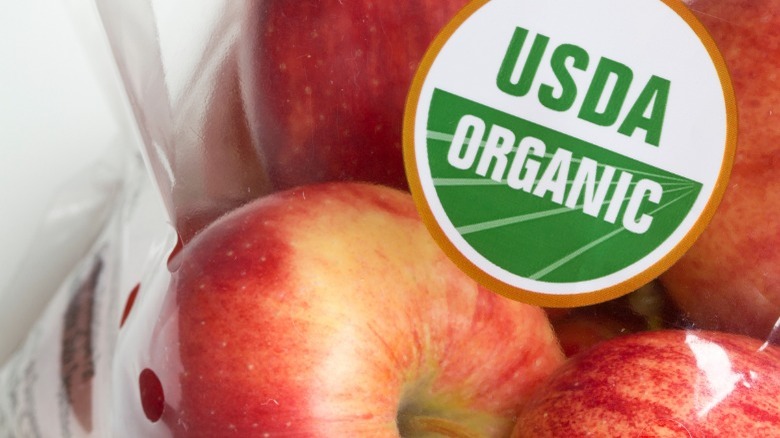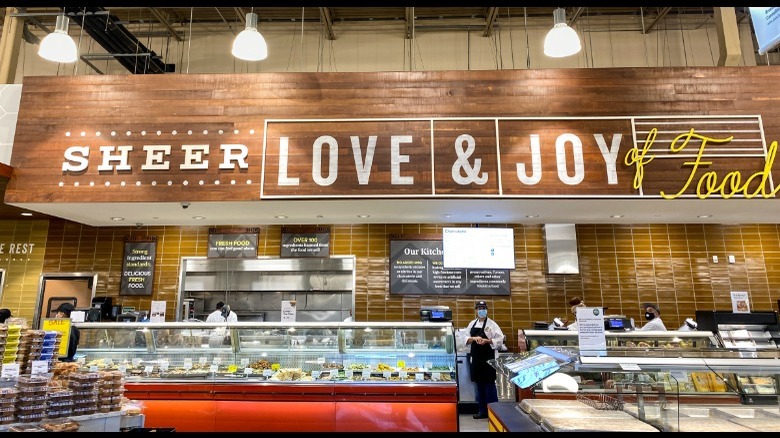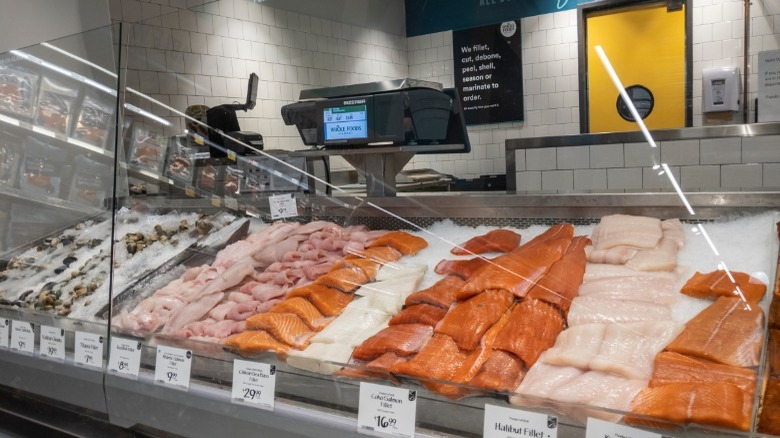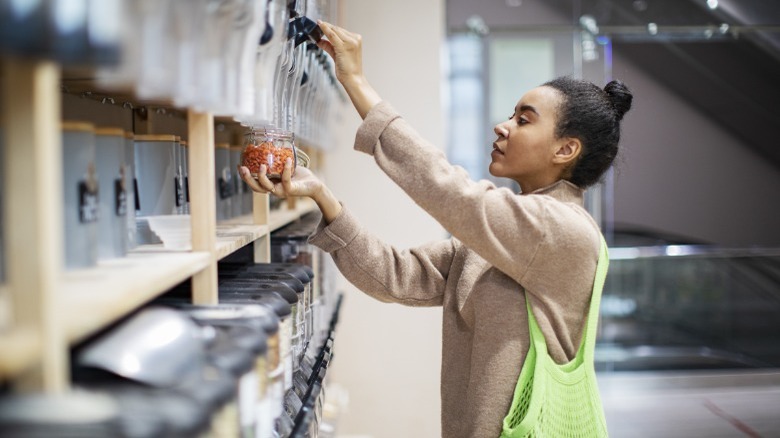15 Things You Probably Didn't Know About Whole Foods
We may receive a commission on purchases made from links.
Ask anyone today what they think of Whole Foods Market, and you'll get a range of reactions. Some will roll their eyes, muttering about "crunchy moms" and high prices — indeed, the store is often called "whole paycheck." Others shrug, saying they'll go there when they need specialty items but don't shop there regularly. Then there are those who get excited about the latest new item at their local store.
Nearly everyone today knows about Whole Foods and has an opinion, good or bad. But, you probably didn't know that the store had humble beginnings and its rise in popularity didn't come without its share of challenges. That success was not by chance. In an interview with David Rubenstein for Bloomberg in October 2020, John Mackey, founder, and former CEO, said he was driven by his purpose to "make the world a better place and get people to eat natural, healthy organic foods." Mackey built the store from modest beginnings to making Whole Foods a household name synonymous with healthy living.
Whole Foods was started by a College Dropout
The first store that ultimately became Whole Foods Market started out as SaferWay in 1978 in Austin, Texas by John Mackey at the tender young age of 25. SaferWay started as a typical health food store, but Mackey was not your typical store owner.
Like other entrepreneurs destined for greatness (think Steve Jobs and Mark Zuckerberg), Mackey dropped out of college and raised $45,000 — mainly from family and friends — with then-girlfriend Renee Lawson Hardy. Soon after, the two became homeless. Both were evicted from their apartment after it was discovered that they stored SaferWay products there.
The couple decided to live at their store despite the commercially-zoned space not having a proper shower. It did, however, have a restaurant. Speaking to Fast Company in 2004, Mackey said, "Renee and I would take showers in the Hobart dishwasher in the restaurant, you know, using the spray hose." It's ironic that a man so passionate about clean eating and living would be showering with a dishwasher hose.
Mackey stepped down as CEO of Whole Foods in 2002 after holding the position for over 40 years. The torch was passed to Jason Buechel, who was mentored and influenced by Mackey for almost a decade before taking the helm of the supermarket chain.
A Flood Destroyed the First Store
By 1980, John Mackey and Renee Hardy had partnered with Craig Weller and Mark Skiles, who ran Clarksville Natural Grocery store. The two stores merged to become Whole Foods Market on September 20th, 1980. However, Whole Foods history was destined for more devastating misfortune.
On Memorial Day, 1981, the city of Austin experienced a deadly and devastating flood that caused millions of dollars in damage and the store was no exception. According to Whole Foods, the inventory and equipment were wiped out, causing around $400,000 in damages, with no flood insurance to help with repairs. However, employees from the store and local volunteers rallied to clean up and rebuild — they opened 28 days later.
This astounding support prompting a quick comeback was surely a testimony to the store's popularity. In fact, it was just a few short years later, in 1984, that Whole Foods began its expansion outside of Austin to Dallas and Houston.
Whole Foods Was a Pioneer in Online Grocery Shopping
Whole Foods was at the forefront of online grocery shopping. They opened their first virtual venture, WholePeople.com, in the late '90s. They dropped the site after merging with Gaiam in 2000. Despite this misstep, Mackey and his team kept a keen eye on e-commerce which came to fruition when Amazon bought Whole Foods for $13.7 billion in 2017.
However, the truth may be a bit more complicated than that. In 2017, Whole Foods had not been performing well in the stock market. The company was facing a hostile takeover from investors and approached Amazon — after reading it was interested in buying Whole Foods.
After the merger in August of that year, it was apparent the two companies were not a perfect fit. When Amazon staffers came into the store to fulfill orders, Whole Foods employees complained due to a clash of company cultures.
In 2018, Amazon Prime launched nationwide discounts at Whole Foods to their members which would help boost sales at their recent acquisition. However, a 2022-23 survey by the research and advisory firm Coresight shows that less than 14% of Prime members shopped at Whole Foods, compared to 55% shopping online at Amazon Fresh (via SuperMarket News).
You Can Ice Skate at Whole Foods
Yes, that's right! Well, not all locations, but Whole Foods in Austin sports a seasonal ice skating rink on its roof. You will have to wait for the winter holidays and pay for admission, but that's a great excuse to bring your kids to the grocery store. When it's not covered in ice, though, you can find other attractions and events at the flagship Austin location, including Shakespeare productions, live concerts, and yoga classes.
But, that's just the tip of the iceberg of what the Austin Whole Foods has to offer. It hosts a variety of eateries — 10 as recently as December 2022, where dining options include sushi, tacos, and BBQ. There's also a juice bar and coffee station. The next time you visit Austin, you might need to plan an entire day trip to Whole Foods.
Whole Foods Held a Guinness World Record
Whole Foods briefly held a title in Guinness World's Records for, believe it or not, cheese. Not only that, but they faced off against a Canadian food retailer to get and keep the record.
In 2008, Whole Foods decided to go for the record of the most Parmigiano-Reggiano cheese wheels cracked simultaneously, which Cathy Strange, global cheese buyer for Whole Foods Market describes as an "exciting event where [shoppers] can witness the talent of our cheesemongers," (via Whole Foods). 176 stores participated in this endeavor, helping them to snag that year's title by cracking open almost 300 wheels. They won the title a second time, in 2013, by cracking 426 wheels of cheese — with each wheel weighing as much as 85 pounds.
Sadly, Whole Foods lost the title in 2014 when Canadian supermarket chain Loblaw cracked a whopping 1,209 cheese wheels. They hold the Guinness record to this day.
Whole Foods Has Its Own Diet
Did you know that Whole Foods has its own diet? In 2017, Mackey published "The Whole Foods Diet? The Lifesaving Plan for Health and Longevity." He developed the diet himself, claiming that it simplifies the approach to clean eating.
Despite being vegan, Mackey is not a fan of denying yourself food in order to lose weight. Mackey told NBC News, "When you combine the things our body naturally craves — whole starch foods (sweet potatoes, brown rice, beans, etc.) with fruits and vegetables — you can eat all you want and you'll lose weight."
As is a self-proclaimed "picky eater," his journey to healthy eating took time. His diet changed after moving into a vegetarian co-op when he was still in his 20s. Despite never eating vegetables before, the influence of the people around him quickly led him to embrace the vegetarian lifestyle.
A few years later, he started adding fish to his diet and began to put weight back on. He decided to cut out all animal products and remove processed foods. That changed everything about his health for the better, including his weight, cholesterol, and blood pressure.
Whole Foods Is the Place to Shop for Olive Oil
Whole Foods is one of the best places to buy good quality olive oil. Why? OliveOil.com sent its taste-testing team to explore Whole Foods' extensive selection of olive oils, which encompasses a broad range of price points, flavor, intensity, and fruitiness. They found that the best oils at an affordable price were primarily the company's private-label brands.
One of the great features of buying extra virgin olive oil (EVOO) at Whole Foods is that their private-label products contain lots of information on the ingredients, including the type of fruit used, bottling and testing dates, and country/region of origin. You would be hard-pressed (pardon the pun) to find a better source of fresh, quality EVOO for a reasonable price to make your olive oil recipes.
The chain even staffs its own EVOO-certified Associate Savante. That title is granted by Savantes, which is an organization that sets the world standard for EVOO.
Whole Foods Carries Limited Edition Items
Did you know that Whole Foods carries limited-edition holiday items? Well now you do. Their Organic Hot Cocoa Flavored Ice Cream Sandwiches bring together hot and cold season items to create a treat that sounds irresistible. This product is also Kosher dairy-certified. Their Market Plant-Based Roasts with Portobello Mushroom Stuffing and Gravy was a decadent option keeping in line with the vegan lifestyle favored by their former CEO. Let's hope they offer it again this holiday!
And, we can't think of a better way to celebrate winter holidays than with Riced Cauliflower Stuffing, which adds herbs, carrots, cranberries, onion, and celery to the main vegetable. All of the stuffing with none of the glutens! We can't wait to see what they will release for the next holiday season.
Holiday items or food are not the only limited edition products that Whole Foods carries. For the last few years, they have released the Whole Foods Beauty Bag at select locations for a short window. Lucky shoppers who snagged this bag got a selection of beauty products for a huge discount. The 2023 bag contained $80 worth of items for just $20. Beauty shoppers, keep an eye out for this item in April!
Whole Foods Charities Support Healthy Eating
Whole Foods' mission of expanding healthy eating is not limited to its retail operations. They operate several charities to help feed a hungry world — and that's not just contributions by executives. Their 2021 Impact Update Report shows that their team members supported nearly 500 non-profit organizations. Their customers donated over one million dollars to the Whole Planet Foundation, their non-profit dedicated to eliminating poverty around the world by providing microloans to entrepreneurs.
Whole Foods runs several other community-giving programs, including the Local Producer Loan Program which lends money to small-scale and local producers in the U.S. and Canada. This program allows Whole Foods stores to carry a diversified selection of local foods. The Whole Cities Foundation helps to provide healthy foods for at-risk communities by giving grants to eligible partners.
Finally, the Whole Kids Foundation provides education and grants to schools to promote healthy cooking and eating. They partnered with PBS KIDS to share content that educates kids on nutrition. Many stores give you the option to donate to this program when you check out.
Former CEO John Mackey Made a Salary of One Dollar per Year
During his tenure as CEO, John Mackey elected to take an annual salary of one dollar. While it is not clear if current CEO Jason Buechel is following suit, Whole Foods employees have open salaries — which means that they can look up how much each other earns.
This policy, introduced in 1986, was initially designed to help employees understand pay structure and worth. Not everyone agrees with this approach. But, Whole Foods believes that everyone talks about salaries, and so the conversation is part of the company's culture and public knowledge.
Mackey saw his fair share of controversy on the subject. "I'm challenged on salaries all the time," he told Business Insider. "'How come you are paying this regional president this much, and I'm only making this much?' I have to say, 'Because that person is more valuable.'" That sounds like a bitter pill to swallow but Mackey also claimed that if you proved your worth, you'd see an increase in pay.
Whole Foods Was the First USDA Organic Retailer in the US
Whole Foods focuses on being a leader in sustainability and health. For example, they claim to be the first USDA Certified Organic retailer in the nation (via Whole Foods). This type of certification means that the store must adhere to strict regulations when overseeing the handling of organic foods, to ensure that customers get exactly what they were promised.
Certification for a store works the same as for a farm. Retailers must ensure that the ingredients and foods are organic, are not subject to tainting or contamination, adhere to strict cleaning and sanitation guidelines, and are properly labeled.
Whole Foods is a leader in many other areas of sustainability. For example, the chain is a leader in promoting sustainable energy. At least 50 Whole Foods retailers rely on solar power for lighting, and they have earned the distinction of being the first retailer to embrace this innovation.
Whole Foods Has a Rap Song
We're not sure how cultish people are about their Whole Foods shopping habits but the store does have its own rap song called "Whole Foods Parking Lot," which is about, not surprisingly, waiting for the perfect parking spot. Naturally, the rapper is driving an electric vehicle. Once inside, DJ Dave pulls out his organic shopping list only to discover they've run out of his favorite cheese!
In 2022, Whole Foods released their Be Happy, Healthy, and Whole commercial with an upbeat and catchy tune that had everyone asking, "What is that?" The song is "Every Beat of My Heart" by The Du-Ettes — a blast from the past originally released in 1964.
If you are not a fan of that kind of music but want some good tunes for your shopping experience, you can find plenty of Whole Foods playlists and soundtracks on YouTube. Check out "Unofficial Whole Foods Market Radio" on Spotify, for a playlist that spans the last 10 years.
Whole Foods Serves Your Needs (or Whims?)
Special requests are one of a handful of insider secrets that Whole Foods provides shoppers. They have a "try before you buy" policy. All you have to do is ask a representative to sample something and they'll open most items on the spot. One employee reportedly told Glamour that if an item is "perishable like yogurt, team members may offer shoppers a free product so they can take it home and try it." However, this may not happen every time!
Whole Foods will also custom cut, trim, and package items for you. That includes trimming out vegetables, getting a wedge of a cheese wheel (Parmigiano-Reggiano perhaps?), or asking the butcher to give you a particular cut of meat.
Trying products in advance reduces the possibility of returns but when it's required, Whole Foods has a comprehensive return policy that covers many, but not all, items. They'll even refund gift card items and exchange WIC purchases, subject to regulations.
Whole Foods Only Carries Responsibly-Sourced Seafood
This store may be one of the best places to buy sustainable seafood. According to Whole Foods' seafood standards, all of their wild-caught seafood is "certified to meet the Marine Stewardship Council Standard for sustainable fishing or rated either "Green" or "Yellow" by the Monterey Bay Aquarium Seafood Watch program." These standards guarantee you the best chance that your seafood is sustainable.
Whole Foods also offers farm-raised seafood, since wild-caught fish is not always available and is labeled with their own "Responsibly Farmed" logo. Whole Foods' policy requires fish to be traced back to their farm of origin and that they are not fed antibiotics, growth hormones, synthetic parasiticides, and poultry or mammal products.
And bonus? You can have your store's fishmonger clean, debone, peel, devein, or otherwise prep the seafood as you need so it's all ready to cook when you get home. Check out how to shop at Whole Foods' seafood department.
Whole Foods Won't Waste
You may not know this, but Whole Foods is committed to fighting food waste. They upcycle foods, meaning they create dishes from "neglected and underused" ingredients rather than throwing out foods that are still good.
The chain also donates expired foods to places in need such as food pantries and nonprofit organizations. In 2013, Whole Foods won the Outstanding Food Donor Award from Food Lifeline, a nonprofit in Washington state that works to end hunger there. They have been partnered with Whole Foods since 1999.
In 2008, Whole Foods became "the first U.S. grocer to ban disposable plastic bags." But, the chain hasn't been flawless in pursuit of sustainability. In 2016, they began selling peeled oranges in plastic containers and were called out by customers prompting them to immediately remove the offending items. With all the stories of waste at other stores, we definitely approve of Whole Foods' efforts.

